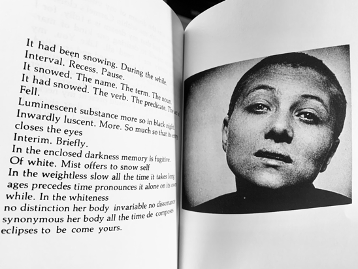“What is it like at the beginning of the world?”
– Alice Notley, “Women and Poetry”
I am most interested in writing that actively engages in citation, constellation—where deliberate movement with other voices pushes the writer beyond their self and into some kind of otherwise nonexistent sociality. I’d like to use this blog space, then, to spend time reading citational works by several contemporary female poets: Harmony Holiday, Simone White, Fanny Howe, Theresa Hak Kyung Cha and Anne Carson. Through their writing, I find citation as a kind of feminist world-building that gestures towards the utopian. Each author uses citation in different ways—with epigraphs, playlists, photographs and embedded quotations—yet the illuminations of racial, gendered and environmental violence through their distinct practices enact a formal and embodied resistance against what Holiday calls “parasitic invasions.” Citation facilitates a dynamic voice that resists solipsism and yields connection.
In “Women and Poetry,” Alice Notley notes that “there may be nothing of women in the way any poem looks now, in what its form is—the entire soil, all layers and most nutrients, are for all purposes male.” She then asks, “What would it be like to make a female poetry? […] What would another poetry possibly be like? […] Can there ever be any value in sexual polarization of activity? […] What is it like at the beginning of the world?”

Dictee, Theresa Hak Kyung Cha
Notley notes the enormity of the task—the task to hold women and poetry together, the task to make something new, the hubris involved when there are “too many same thoughts” while “the world is dying.” She writes: “the poem we can’t find is a whole new earth.”
After years of fearing particular spaces around the country, not knowing if my abusers would be present there too, my penchant for citation may also lie in a desire for safety while actively keeping my gaze both of and beyond myself. Post-trauma, I found my writing transform in response to my fear of unsafety. I began quoting more authors, mostly non-male, moving with their humanity to help me with mine. I wanted to be surrounded. In Dictee, Theresa Hak Kyung Cha writes that memory is an empty theatre. If my memory was a blank, I found a balm in listening to voices beyond myself—through writing, I invited these voices into my memory, my empty theatre.
It’s worth emphasizing Notley’s worldly focus; the “beginning of the world” she writes about is inherently utopian because it’s impossible under late capitalism. And we can’t go back—back to what? The entire soil is male, she writes, and always has been. The role of the imaginary in citational poetics, then, is crucial. The page becomes a space of possibility, connection. The page becomes a map for an impossible, but vital, world. Such a world may only exist ideologically, but the opportunities for relationship through citation yield a relief from our current world, and a multiplicitous framework for moving through violence towards healing. As Harmony Holiday concludes “An Artist’s Guide to Herbs: Cloves,” which I’ll write about in this series:
“Now she pushes her own heart up the mountain, now she carries it down with a poultice of herbs and dreams to remember.”
AM Ringwalt is a writer and musician. Her words appear or are forthcoming in Peripheries, the Washington Square Review and the Bennington Review. Called “unsettling” by NPR and “haunted” by The Wire, she has performed her music at the Watermill Center and the New Yorker Festival. @amringwalt